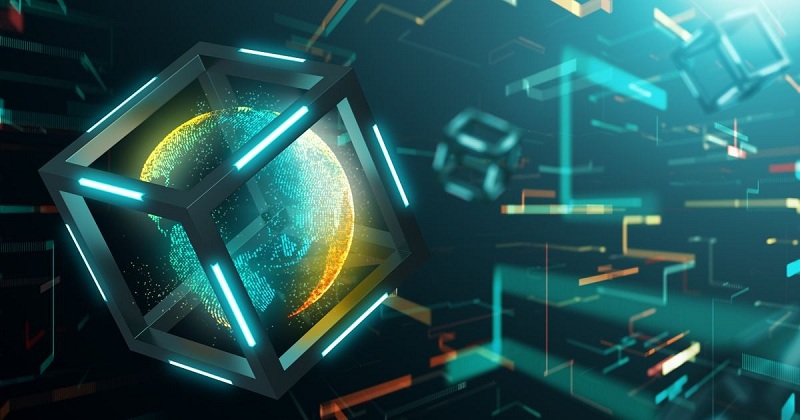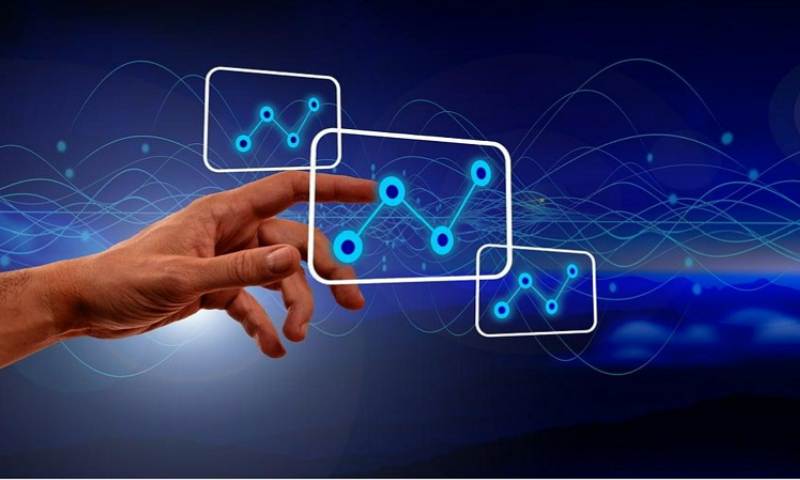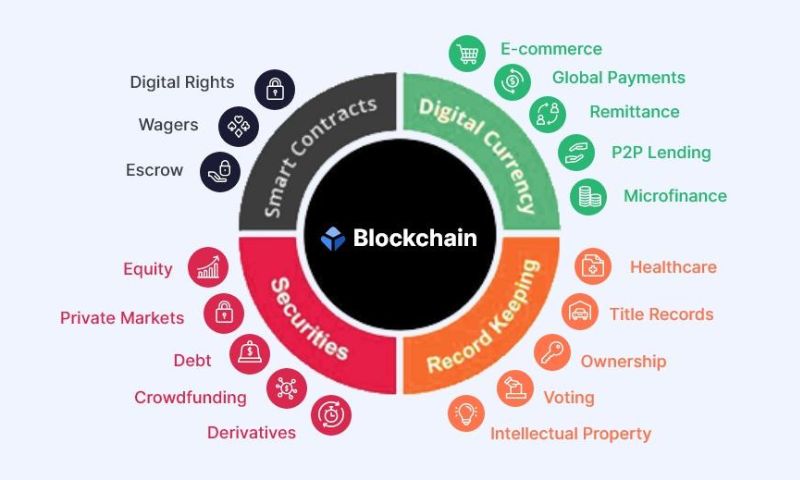Blockchain Beyond Bitcoin: Next-Gen Applications on the Horizon
Let’s dive into the Potential applications of blockchain in the future, far ahead of its fame as the backbone of Bitcoin. This tech will shake up how we bank and swap cash. Think about dealing with your dough without a bank in the middle – that’s what DeFi is doing. But it’s not just money talk; your house buy could get a lot smarter with blockchain bits doing the heavy lifting. Lawyers, too, are due for a big shift, as smart contracts can cut the red tape. And wait until you hear how it’ll change your doctor visits and keep the meds you take safe. Plus, your ID is about to get a digital facelift, making proving you’re you easier and more private. Stick around – we’re just revving up!
Transforming the Financial Landscape: The Rise of Decentralized Finance (DeFi)
Revolutionizing Traditional Banking
Picture going to a bank that never sleeps or takes breaks. This is DeFi, or decentralized finance. It’s a new way to handle money using blockchain. It’s global, never closes, and has no CEO. Smart contracts make this possible. These contracts are lines of code on the blockchain that work on their own. They follow rules set by people. And they can move money without needing a bank to say yes.
This means you can borrow, lend, and earn interest directly. No need for a middle man. It’s more open and often cheaper too. You just need an internet connection. This change is huge. It’s like a money revolution! DeFi could make life better for lots of people who don’t have banks nearby. They can now join the world’s financial system. So, we’re seeing just the start of what DeFi can do.
The Emergence of DeFi Lending and Borrowing Platforms
Now let’s talk about lending and borrowing with DeFi. Unlike old banks, these DeFi platforms work all day and night. Imagine earning money by lending out your savings from home. Or getting a loan quickly without lots of paperwork. DeFi platforms use blockchain to make this happen. They match people who want to lend money with those who need to borrow. Smart contracts handle it all. They keep track of everything and make sure it’s fair.
DeFi lending is growing fast. More people are learning that they can use their crypto as collateral. This means they can get loans without selling their coins. For lenders, it’s a new way to make their money work harder for them. No need to trust a person or company. Just trust the code. The code runs the show and doesn’t make mistakes or get greedy.
DeFi is still new and can be risky. But it’s also an exciting area with much to explore. As time goes on, DeFi could reshape how we all think about and use money. It’s like we’re making a whole new path in the world of finance. And it’s open for everyone to walk on.
Unveiling the Power of Smart Contracts in Various Industries
Smart Contracts in Real Estate Transactions
Smart contracts change how we deal with property. They cut out middlemen, making buying and selling faster and cheaper. With smart contracts, you can trust the process even more. Everything is clear and automatic.
Say you want to buy a house.
The smart contract checks everything, like if you have money and if the seller truly owns the place. Once it’s all good, the deal happens right away. No waiting for banks or paperwork.
Smart contracts can also split property ownership between many people easily. This opens up real estate to more buyers, who can now afford smaller pieces. It’s called real estate tokenization. This is huge because it means more people can invest in property, not just the rich.
Enhancing Compliance and Efficiency in the Legal Sector
Smart contracts are also shaking things up for lawyers. They can turn long, boring contracts into smart ones. These smart contracts run themselves when certain things happen, without anyone having to check.
For legal stuff, this means less time spent on checking if a contract is being followed. It also makes sure everyone is playing by the rules. No one can try to twist things in their favor when a smart contract is in charge.
But remember, smart contracts must be made well. Bad coding or forgetting a rule can cause trouble. Hence, experts are needed to get these details right. This way, we can all trust that smart contracts do exactly what they say they will do.
These smart contracts are just starting to show what they can do. But one thing is clear. They will be a big deal across all kinds of jobs, not just in finance or tech. They’ll help keep things honest and make sure deals go smoothly. With blockchain, we’re stepping into a future where we can trust the systems more, and that’s something to look forward to.
Advancing Healthcare with Blockchain: Secure Data Sharing and Management
Improving Patient Data Privacy and Access Control
Imagine your health records being as easy to share as an email but super secure. That’s what blockchain brings to the table. With blockchain in healthcare, we see a future where your secrets stay safe. No one sees them unless you say so. You can visit a doctor miles away and they get your health history fast, without worry. It’s not just a dream. This change is on its way, making healthcare private and smooth.
A quick answer to “How does blockchain improve patient data control?” It makes data sharing selective and secure. After this quick answer, let’s expand. Blockchain lets you pick who sees your health info. Each access is recorded. So, you feel at ease knowing your data’s handled right.
Counteracting Pharmaceutical Frauds with Traceable Supply Chains
Fake meds are a big problem. They can hurt instead of heal. But here’s a ray of hope: blockchain can stop this bad stuff. By checking each step, from making to taking, blockchain puts an end to fake drugs. It tells us where our meds come from, and if they’re the real deal.
Answering “How does blockchain fight against fake medicines?” Simple: it tracks every move a drug makes. This way, everyone along the line, like makers and shippers, stays honest. Now to dig deeper, when a medicine is made, blockchain records it. Every handoff along its journey is noted. You get your meds, and you can be sure they’re safe because blockchain watched over them all the way to your hand.
Blockchain in healthcare means you get better without worry. Your doctor has the info they need. Your pills do what they should. It’s a future we can look forward to. And it’s all thanks to blockchain.
Shaping the Future of Identity: Blockchain-Enabled Digital Identity Solutions
Decentralizing Personal Data Management
Let’s talk about keeping personal info safe. Right now, many sites hold our info. This can be risky. Blockchain can change this. It allows us to hold onto our own data. We decide who sees it. How cool is that?
The Role of Blockchain in Global Citizenship and Verification Systems
Having one ID for everything is handy. It can help people travel easier. Also, it means less time proving who you are. Blockchain can make this happen. Countries can use it to check info fast and keep it safe. This means quick help for people who need it. It’s a way to make everyone’s lives easier.
We’ve explored how blockchain and DeFi are changing money and business. In banking, DeFi makes loans and savings easier for everyone. Smart contracts cut risks and waste in real estate and law. They make sure every deal is clear and fair.
In healthcare, blockchain keeps patient records safe and private. It helps stop fake drugs by tracking every step from the maker to the user. For our personal data, blockchain gives us control and secures our info. It’s also making global IDs safer and easier to check.
As an expert in blockchain tech, I see its huge potential. It’s making many parts of life better and safer. Remember, this is just the start. Blockchain will keep growing and changing our world in ways we’ve just begun to see.
Q&A :
What are the predicted uses of blockchain technology in upcoming years?
Blockchain technology is expected to revolutionize various sectors by providing enhanced security, transparency, and efficiency. Predicted uses include supply chain management, where it can track the production, shipment, and delivery of products in real-time. Additionally, blockchain may be integral in advancing identity verification processes, securing personal data, and enabling robust cybersecurity measures across industries. Financial services, such as cross-border payments and tokenization of assets, will likely benefit from blockchain’s decentralized ledger, as will voting systems, which can utilize blockchain for secure and transparent electoral processes.
How might blockchain impact data sharing and privacy in the future?
In the future, blockchain could significantly impact data sharing and privacy by creating secure, decentralized platforms that ensure user control over personal information. Blockchain’s inherent characteristics — immutability, distributed control, and encryption — are poised to empower individuals with the ability to share data selectively and transparently, while minimizing the risk of unauthorized access or breaches. The potential for self-sovereign identities that allow users to own and control their digital identity is one profound example of blockchain’s role in enhancing data privacy.
Can blockchain technology contribute to sustainable environmental practices?
Yes, blockchain technology has the potential to contribute to sustainable environmental practices. It can help in tracking the carbon footprint of products by providing transparent and immutable records of emissions data, make renewable energy markets more accessible by allowing peer-to-peer energy trading, and ensure the integrity of environmental data. Furthermore, blockchain can underpin supply chain solutions that promote responsible sourcing and can also facilitate the tokenization of carbon credits, streamlining the process for companies to invest in sustainability initiatives.
What advancements might blockchain bring to healthcare in the future?
Blockchain technology is poised to offer significant advancements to healthcare by improving data security, patient privacy, and interoperability between systems. It might enable secure storage and sharing of medical records, giving patients more control over their data and making it easier for healthcare professionals to access vital patient information. The authenticity of pharmaceuticals could be guaranteed through a drug verification system, preventing counterfeit drugs. Moreover, blockchain could be used to streamline clinical trials and research data management, potentially accelerating new medical discoveries and treatments.
In what way could blockchain transform the education sector in the future?
Blockchain could transform the education sector by providing secure and verifiable storage of academic credentials, effectively eliminating the risk of credential fraud and simplifying the verification process for employers and educational institutions. Additionally, it could underpin a more personalized learning experience by tracking student learning progress on a secure platform. Blockchain might also enable new models for educational content and IP rights management, encourage transparent funding and scholarship distribution, and lay the groundwork for cross-institutional collaboration and resource sharing.


